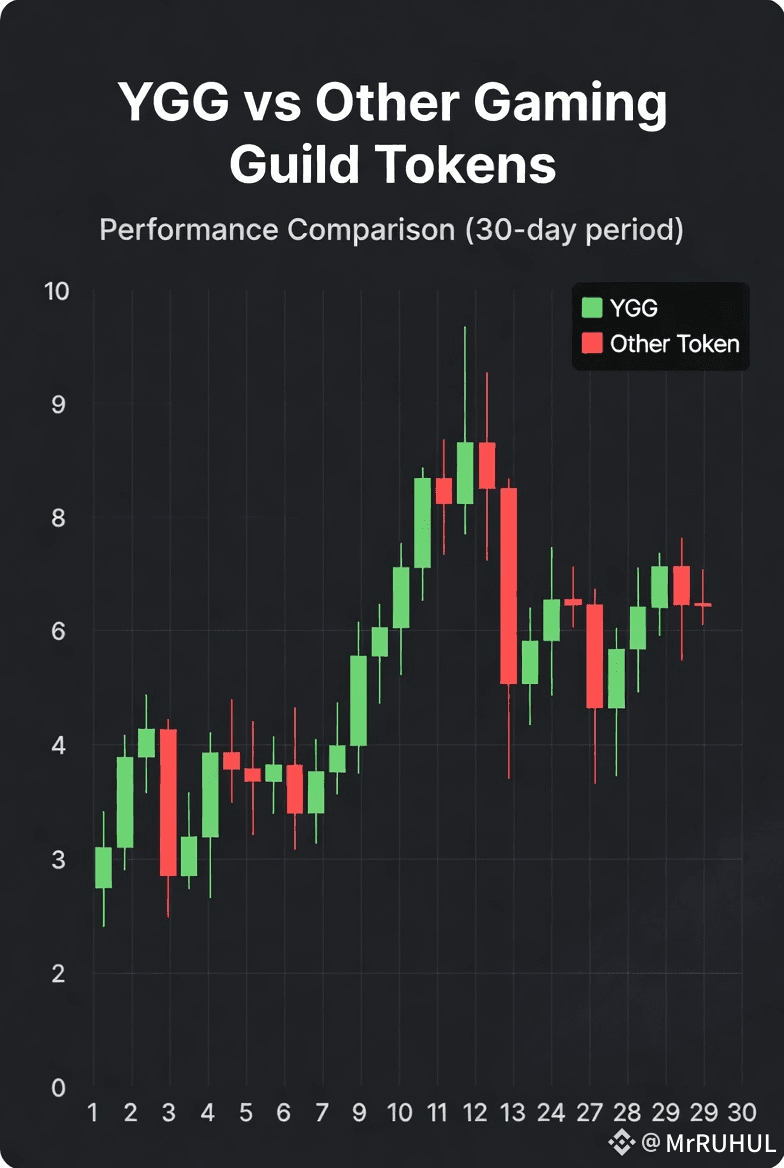YGG (Yield Guild Games) isn’t just another gaming guild token. It started as a “scholarship guild token” like a lot of others, but now it’s grown into something bigger—a real Web3 gaming ecosystem asset. If you want to see what makes it different, it helps to break things down into four areas: story, token design, ecosystem reach, and how well it holds up over time.

1. Story: More Than Just Scholarships
When guild tokens first hit the scene, most of them—YGG included—were all about Axie Infinity and the “scholarship” model. That was the big thing: rent out NFTs, split the rewards, repeat. But when that hype faded, so did the story behind a lot of these tokens.
YGG took a different route. Instead of clinging to the Axie era, it pivoted to become a kind of Web3 gaming index and infrastructure play. Other guild tokens still stick to the old “we rent NFTs, you get a cut, that’s it” pitch. YGG, on the other hand, now offers:
Access to multiple games
Questing and mission platforms
Partnerships with all sorts of Web3 games and blockchains
So, YGG’s story isn’t stuck in the past. It’s built for whatever comes next, not just for one game or trend.
2. Token Utility: Actually Useful, Not Just Speculative
A lot of guild tokens promise holders “exposure to guild earnings,” but the reality is usually pretty vague. Governance is weak, and honestly, there’s often not much reason to hold the token instead of just buying game assets yourself.
YGG tries to fix that by giving its token some real roles:
You get access to quests, events, allowlists, and community programs
You get to vote on partnerships, incentives, and where the ecosystem goes
The token lines up with sub-DAO and regional guild growth, depending on how things evolve
Meanwhile, many competitor tokens are just speculative—chips people trade with barely any real use on-chain. The more YGG can move rewards and community activities on-chain, the more it stands out from these “passive” tokens.
3. Ecosystem & Brand: Built-In Network Effects
YGG’s brand is a huge advantage. It’s got:
A strong reputation from the early play-to-earn days
Ties with big Web3 games, launchpads, and infrastructure projects
A big, active community spread across different regions
Some other guild tokens have tight local groups or focus on a single game, but not many have the kind of global name recognition YGG does. For a lot of Web3 games looking to grow, YGG is the go-to partner. That just keeps the flywheel spinning, bringing more opportunities back to YGG.
4. Risk Profile and Staying Power
Every gaming guild token deals with the same problems:
Wild swings in game economies
Changes in how games make money (moving from play-to-earn to more NFT-light setups)
Competition from launchpads, NFT marketplaces, and new distribution models
But YGG isn’t tied to just one game or chain. Because it’s spread out across games, regions, and partners, it acts more like a portfolio than a single bet. Most guild tokens are just riding one wave—if that dies, so do they. YGG has a better shot at sticking around, no matter how the meta changes.
So, what’s the bottom line? YGG stands out because it keeps evolving. While most guild tokens are still narrow, game-focused, and pretty much just speculative chips, YGG keeps pushing forward. It’s becoming a multi-game, multi-chain Web3 gaming index and infrastructure token. Sure, it’s still exposed to market risk, but it’s got a stronger story, deeper roots in the ecosystem, and a much better chance of staying relevant through multiple gaming cycles—not just the last bull run’s hot game.@Yield Guild Games #YGGPlay $YGG

